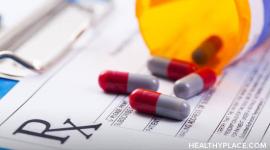Addiction to Prescription Drugs

In-depth information on prescription drug abuse and addiction. Signs and symptoms of addiction to painkillers and other medications. Treatments for addiction to prescription medications.
Recent news stories have highlighted the increasing number of teens and adults abusing prescription drugs, particularly painkillers.
For example, the National Institute on Drug Abuse's 2003 Monitoring the Future survey of 8th, 10th, and 12th graders found that 10.5 percent of 12th graders reported using Vicodin for non-medical reasons and 4.5 percent of 12th graders reported using OxyContin without a prescription.
The White House Office of National Drug Control Policy maintains that past year abuse of prescription pain killers now ranks second—only behind marijuana—as the Nation's most prevalent illegal drug problem. While overall youth drug use is down by 23 percent since 2001, approximately 6.4 million Americans report non-medical use of prescription drugs. New abusers of prescription drugs have caught up with the number of new people that use marijuana. Much of this abuse appears to be fueled by the relative ease of access to prescription drugs. Approximately 60 percent of people who abuse prescription pain killers indicate that they got their prescription drugs from a friend or relative for free. (information on drug abuse statistics)
Addiction to painkillers
Painkillers such as Vicodin and OxyContin are opiates and are very powerful medications against pain, but they need to be taken under the close supervision of a doctor. These same medications, when taken inappropriately, can cause addiction (characterized by compulsive drug seeking and use) as they act on the same places in the brain as heroin does. (Read about: heroin effects)
These painkillers can be very effective in treating individuals with the medical need for these medications; however, using these drugs without the supervision of a physician or for purposes different from their intended use can lead to serious adverse consequences, including death from overdose.
Which prescription drugs are commonly abused?
Prescription drugs that are abused or used for nonmedical reasons can alter brain activity and lead to dependence. Commonly abused classes of prescription drugs include:
- opioids (often prescribed to treat pain)
- central nervous system depressants (often prescribed to treat anxiety and sleep disorders)
- stimulants (prescribed to treat narcolepsy, ADHD, and obesity)
Commonly used opioids include:
- oxycodone (OxyContin)
- propoxyphene (Darvon)
- hydrocodone (Vicodin)
- hydromorphone (Dilaudid)
- meperidine (Demerol)
- diphenoxylate (Lomotil)
Common central nervous system depressants include barbiturates such as pentobarbital sodium (Nembutal) and benzodiazepines such as alprazolam (Xanax).
Stimulants include dextroamphetamine (Dexedrine) and methylphenidate (Ritalin).
Long-term use of opioids or central nervous system depressants can lead to physical dependence and addiction. Taken in high doses, stimulants can lead to compulsive use, paranoia, dangerously high body temperatures, and irregular heartbeat.
Over-the-Counter Drugs
Some people mistakenly think that prescription drugs are more powerful because you need a prescription for them. But it's possible to abuse or become addicted to over-the-counter (OTC) medications, too.
For example, dextromethorphan (DXM) is found in some OTC cough medicines. When someone takes the number of teaspoons or tablets that are recommended, everything is fine. But high doses can cause problems with the senses (especially vision and hearing) and can lead to confusion, stomach pain, numbness, and even hallucinations.
Sources:
- National Institute on Drug Abuse, Prescription Drugs: Abuse and Addiction, August 2005
- The White House Office of National Drug Control Policy, Press Release dated Feb. 20, 2007
APA Reference
Gluck, S.
(2021, December 16). Addiction to Prescription Drugs, HealthyPlace. Retrieved
on 2025, April 13 from https://www.healthyplace.com/addictions/prescription-drugs/addiction-to-prescription-drugs



